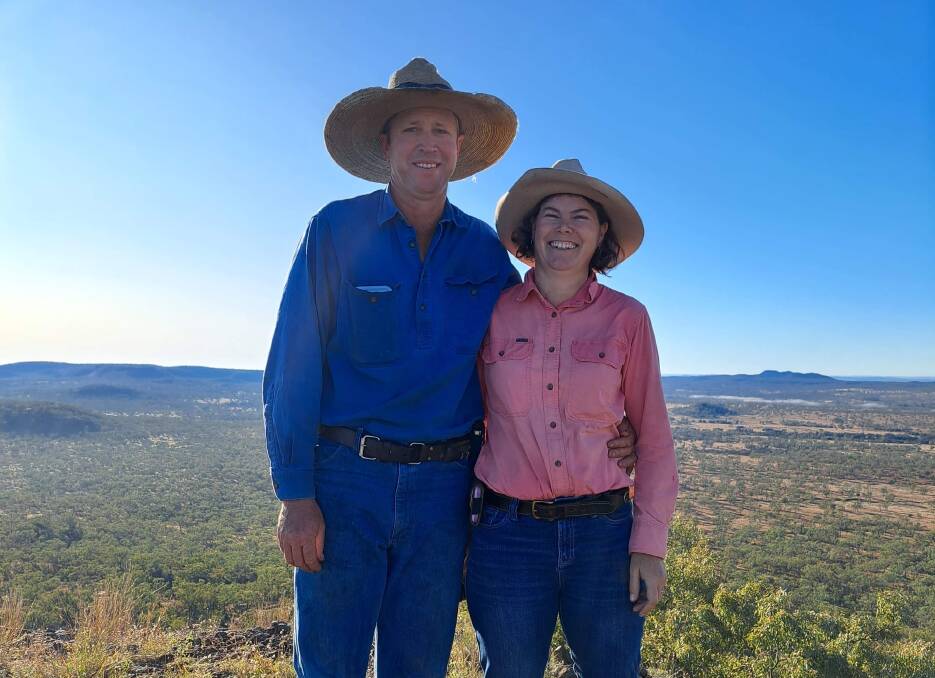Planning to succeed during times of drought

This is branded content for Department of Agriculture and Fisheries.
Adele O'Connor is a fourth-generation beef cattle producer whose family has managed through many seasons. Floods, heavy rains and drought conditions, the O'Connors have seen it all and successfully come out the other side.
Based in the Central Highlands Mrs O'Connor says good planning for seasonal events is a key part of ensuring their business is resilient during tough times.
Right now, their focus is on preparing for the next drought.
"We've been busy putting together a business plan that takes into account potential droughts and extreme weather events," Mrs O'Connor said.
"Initially we put together a business plan to assist us in accessing a drought preparedness grant for building drought-proof infrastructure, but what we found as we went through the process is that planning enabled us to solidify our direction for building our business into the future.
"We created a solid plan for how we are going to grow and what our future looks like.
"It is also a great tool to have in place for the bank as it addresses risk mitigation."
A Farm Business Resilience Plan
In preparation for the next drought and to improve their production systems, the O'Connors are designing a new water system on their property.
"Planning gave us the opportunity to assess our water needs, so we are designing a water supply system that will meet our needs into the future," Mrs O'Connor said.
"Our current water system leaves us short in critical paddocks which means that we often have to sell off stock when the prices are poor as we have no option.
"Planning the new water system will secure our ability to utilise our available feed and give us better options when we are selling stock," she said.
"Developing a Farm Business Resilience Plan has allowed us to gain better knowledge of our business and has allowed us to have options during challenging climate conditions."
Mrs O'Connor said while there were options for getting a government rebate for using a financial advisor to put a plan together, she opted to develop a plan herself.
"I wrote the plan using the business plan template on the Department of Agriculture and Fisheries website.
"I also spoke to a Rural Financial Counsellor who guided me through the process," she said.
Mrs O'Connor said before she started planning, she participated in Farm Business Resilience Plan courses run by the Department of Agriculture and Fisheries and the Rural Financial Counsellors to help formulate her ideas.
Having a business plan that includes drought strategies has put them in a stronger position when the time comes for another drought she said.
"There is always going to be drought and it is better to have a plan going into the hard times rather than to have forced sales," Mrs O'Connor said.
An El Nino watch has been issued by the Bureau of Meteorology predicting a 50 per cent chance that an El Nino may develop later in 2023.
Support is available to all agricultural industries through the Farm Business Resilience Program.
To find out about free training and resources to improve the productivity and profitability of your business visit daf.qld.gov.au/droughtassist
The Farm Business Resilience Program is jointly funded by the Australian Government's Future Drought Fund and the Queensland Government's Drought and Climate Adaptation Program.
Positive feedback to Farm Business Resilience Plan
Other producers have also seen real benefits in doing a Farm Business Resilience Plan for their business:
The Farm Business Resilience Plan has been a great benefit to us in planning for the future of our farm. Previously we would make some notes and a lot of information was stored in our heads but by doing the plan it has made us look deeper into what we are doing and given us a broader view to the future planning of the farm. It has helped us to think of new ideas to improve our energy and water efficiency and develop better programs to help the environment and reduce moisture loss in our soils. We also have a better view on how to focus on the immediate needs for the farm. Rita Carey, Mutchilba
After completing the Farm Business Resilience module, a couple of things stood out -a need to improve in certain areas. We have increased our water storage capacity and irrigation system, however an increased understanding of the soils and hydrology on the property, could indicate the new areas for planning future crops and optimising land use efficiencies. Michael Crane, South Burnett


